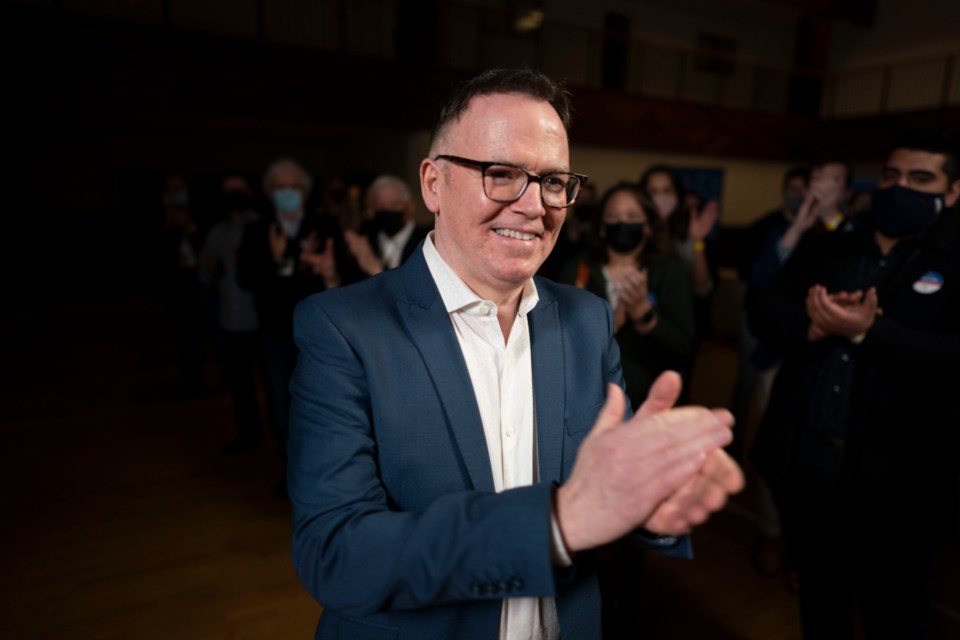BC United Leader Kevin Falcon called it a “genuine, best offer” but there’s no mistaking the air of desperation in his party’s latest pitch for a ceasefire with the surging BC Conservatives.
Falcon publicly revealed details of his non-compete proposal Friday, after BC Conservative Leader John Rustad rejected the idea. One look at the terms and you can see why.
United wanted to carve up the province like a Christmas turkey, setting aside 47 ridings for the surging Conservatives and 46 ridings for his slumping United, with a pledge “not to attack one another over the course of the campaign.”
Had they been successful in squeezing enough ridings away from the governing BC NDP, the agreement stipulated that the United and Conservatives would then form a coalition government, with the leader of whichever party had the most seats becoming premier, the other leader being named deputy premier, and the cabinet positions allocated proportionally.
It’s an awfully presumptuous proposal — not the least of which because United is currently polling a distant third behind the Conservatives, and in some cases as far back as fourth with the BC Greens. The ceasefire assumes both sides are equal, and the Conservatives clearly do not share that view.
The deal would also protect BC United’s 15 returning MLAs from any Conservative challengers. That was a non-starter for Rustad. Some of his strongest ridings are against United incumbents, and giving them up would undercut his growth.
There’s also the question of whether Rustad could go to candidates like Jordan Kealy in Peace River North, and say that he expects them to quit after months of organizing, when they are in strong positions to defeat United incumbents like Dan Davies. Some of the 65 Conservative candidates might listen. Others might just switch to run as independents, and take their momentum with them.
Regardless, Rustad said he’s unwilling to go that route.
The deal could have given BC Conservatives a solid list of 20 winnable ridings. But Conservatives felt it would have shut the party out of the Interior and the North, shoehorning it into an odd mishmash of Okanagan and Fraser Valley MLAs. The party has grander ambitions than that.
The proposal is also presumptuous in that the wider voting public would accept it. More likely, it would spark a backlash, as voters watched two arrogant party leaders divvy up power before they’ve even had a chance to mark ballots.
Premier David Eby has already attacked this kind of approach, crafting speaking lines that the election will be decided at kitchen tables, not corporate board tables, by ordinary voters, not wealthy business elites. This kind of arrangement would have played right into the NDP’s hands.
Nonetheless, Falcon said he felt compelled to at least table the offer, which was put forward by three United party emissaries at a meeting with two Conservative party officials on May 22.
“While I think there’s some good people in that party that would be agreeable to what we were proposing, ultimately John Rustad made the decision to reject it,” Falcon said in an interview.
“While I may disagree with his decision, I respect his decision and now we’ve got clarity.”
Falcon was under pressure by the province’s business community, as well as the old guard of the BC Liberal and federal Conservative parties, to at least try and show some willingness to co-operate. He ruled out a merger, due to some Conservative candidates he considers fringe whackos.
“At the end of the day, we are two free-enterprise parties,” said Falcon. “We have some strong different opinions on some issues, obviously around climate change and LGBTQ issues, but there is commonality amongst fiscal issues and economic issues.
“So the feeling was that if the free enterprise parties could work together, and focus our attention on the real threat, which is continued NDP governance in this province, the public would understand the rationale for doing so. That’s why we reached out.”
It leaves the impression, though, that Falcon was willing to compromise on viewing climate change as real, and LGBTQ2S+ rights as worth fighting for, in order to secure a deal with the Conservatives.
Ultimately, that undercuts his credibility on those issues.
The defeat-the-NDP-at-any-cost mentality, in which you bargain away your principles for ultimate victory, is not necessarily the mindset of undecided middle-road British Columbia voters.
Rustad slammed Falcon for going public with the proposal.
“Time and time again, and in this ‘offer,’ Kevin Falcon has demonstrated that he will always put himself first and will do absolutely anything for power: before the BC United Party, before his own candidates and ultimately before the province,” he said.
Under the proposal, ridings would have been selected by the two parties in a draft format, with Conservatives picking three seats for every one chosen by United, due to the imbalance created by United preserving 15 incumbents.
That scenario, at least, would have been exciting and unique. It immediately brings to mind some sort of NHL draft day, with the two leaders on stage announcing selections, or perhaps the vintage Lotto 6/49 draws on the evening TV news where numbered balls tumbled out of a large machine.
Alas, we shall see no such spectacle.
Instead, it appears we are destined to watch these two parties fight each other to the bitter end — even if it means cutting their noses off to spite their faces, as the NDP skates up the middle to a supermajority government and a fourth term in office.
Rob Shaw has spent more than 16 years covering sa国际传媒 politics, now reporting for CHEK News and writing for Glacier Media. He is the co-author of the national bestselling book A Matter of Confidence, host of the weekly podcast Political Capital, and a regular guest on CBC Radio.


